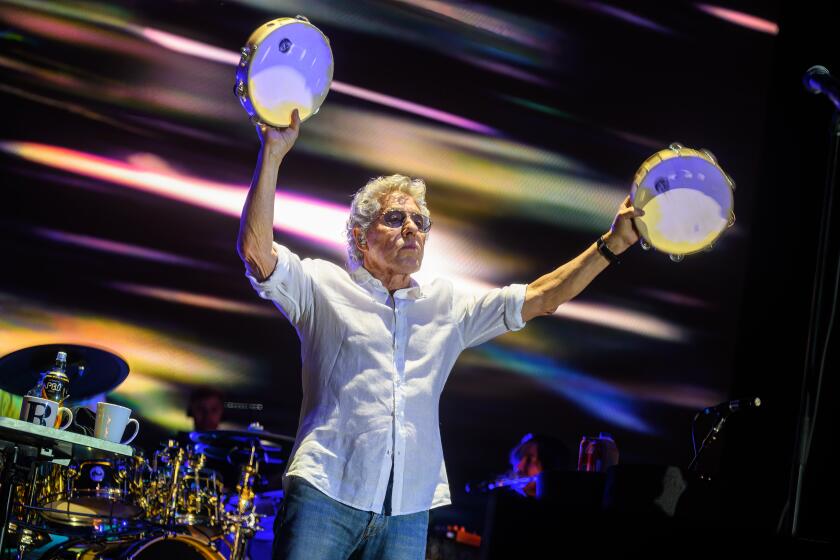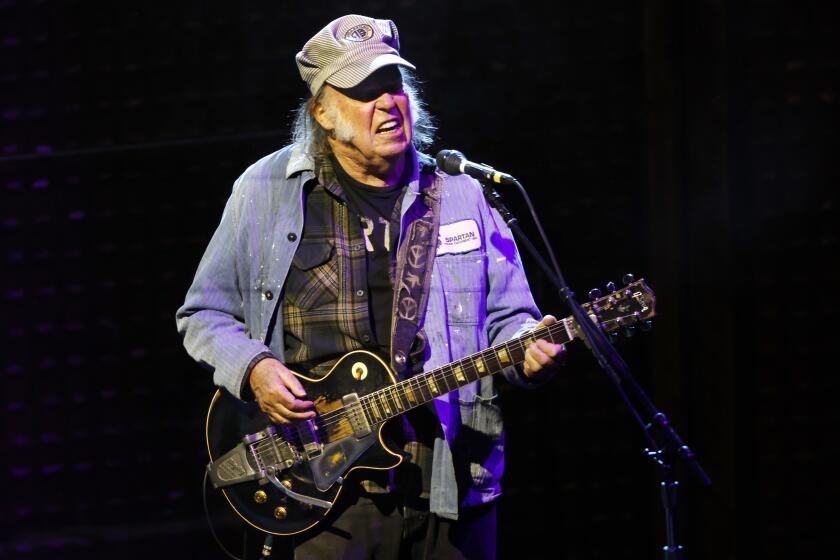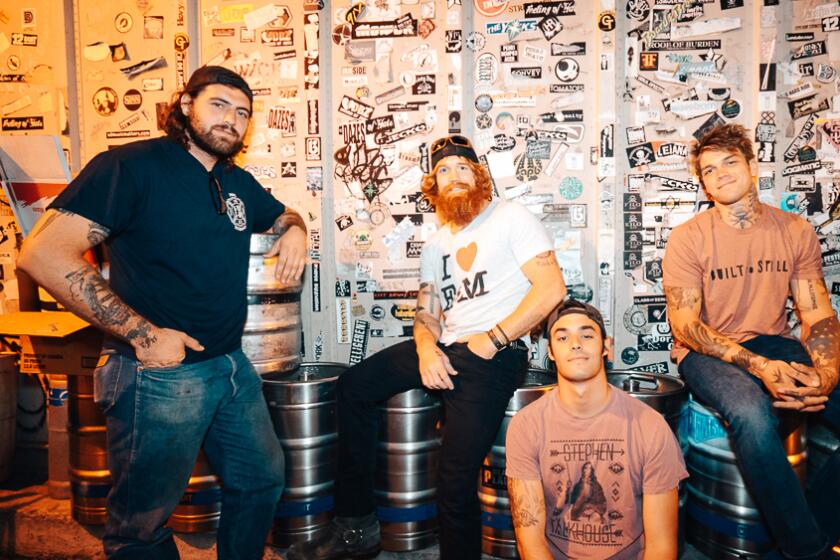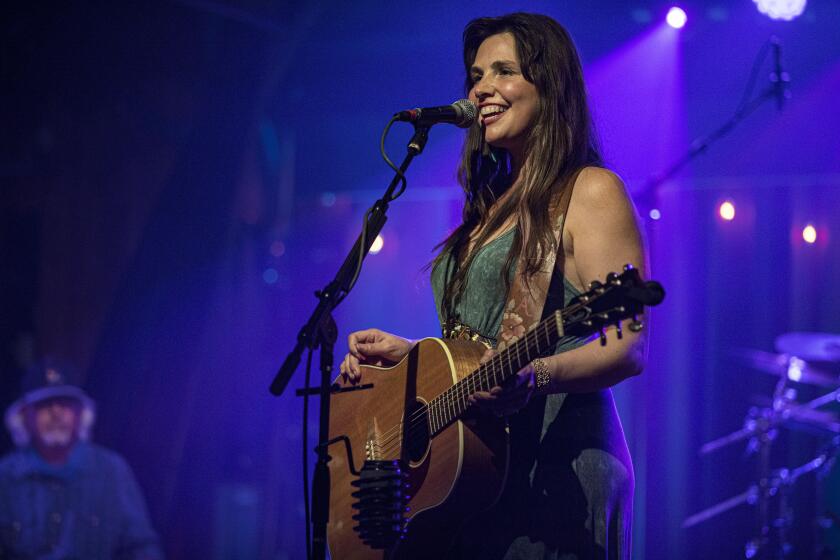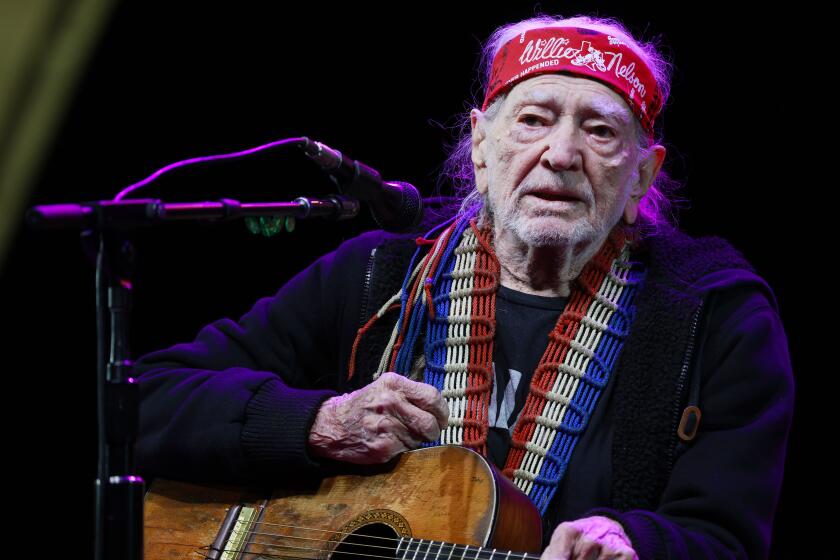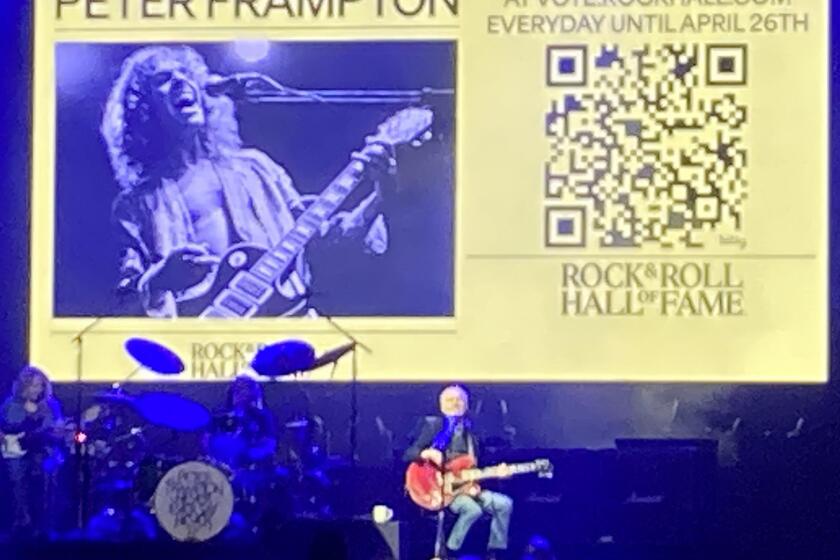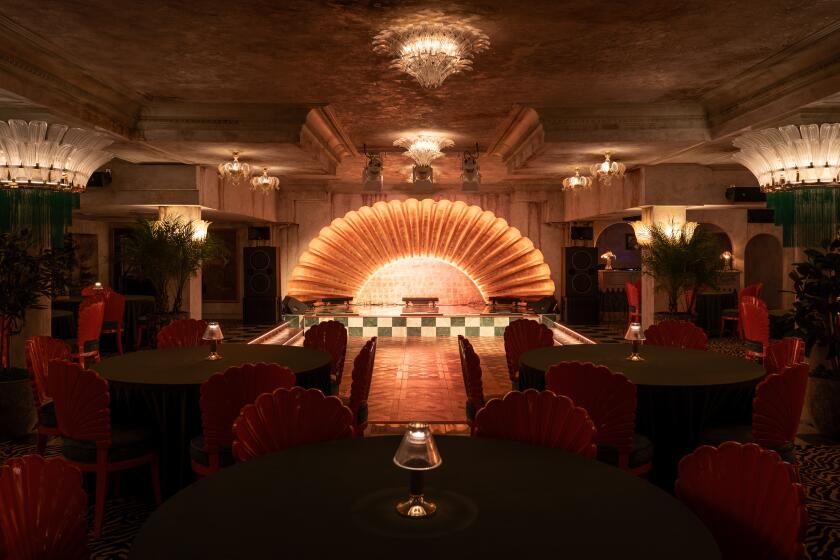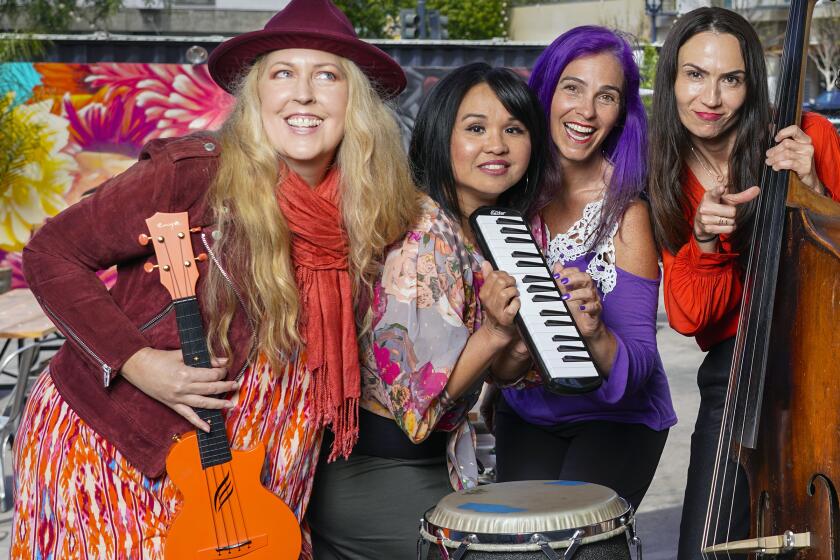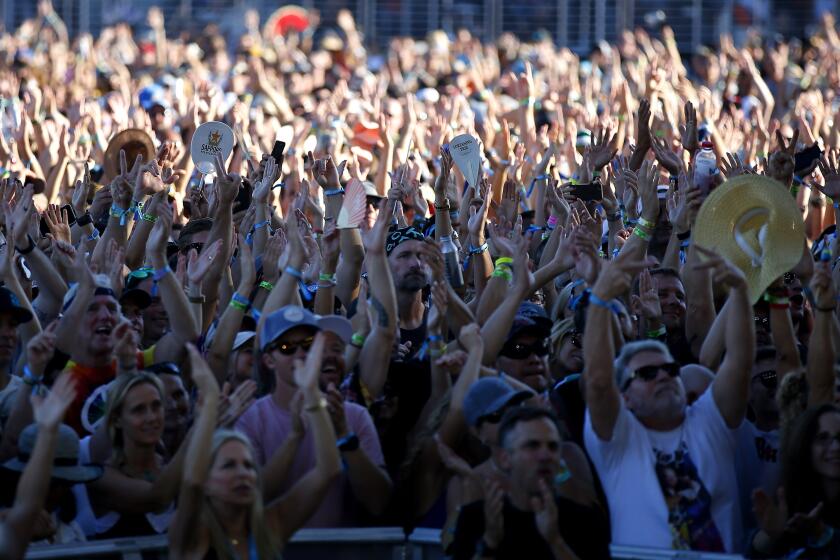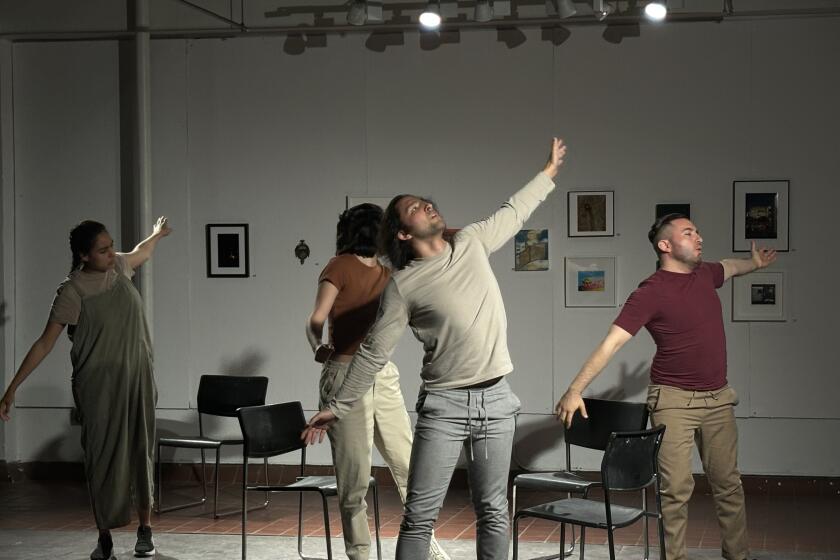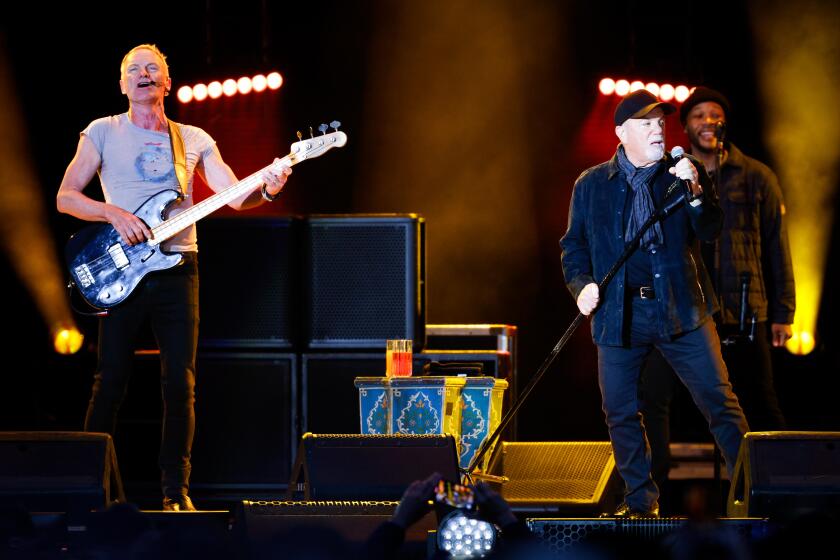Santana will shine Sunday at Kennedy Center
The former Tijuana guitarist will be saluted alongside Herbie Hancock, Billy Joel, Shirley MacLaine and Martina Arroyo
December is shaping up to be a landmark month for Carlos Santana, the former Tijuana guitar slinger turned global music icon.
On Saturday, he headlines an all-star concert in Guadalajara, Mexico, in his home state of Jalisco. The lineup teams him with an array of top Latin artists, who are also featured on Santana’s upcoming album, “Corazon.” They include Juanes, Gloria Estefan, Romeo Santos, Miguel, Lila Downs and the Argentine band Los Fabulosos Cadillacs.
Sunday night, in Washington, D.C., Santana will be one of five Kennedy Center Honors recipients. In front of an audience that will include President Barack Obama and the first lady, he’ll be saluted alongside fellow Rock and Roll Hall of Fame inductee Billy Joel, jazz keyboard great Herbie Hancock (a periodic musical partner of Santana’s), actress Shirley MacLaine and opera star Martina Arroyo. The star-studded fete will be televised Dec. 29 on KFMB Channel 8.
The 36th Annual Kennedy Center Honors
With: Carlos Santana, Herbie Hancock, Shirley MacLaine, Billy Joel & Martina Arroyo
When: Sunday night at 7:30 p.m. at the Kennedy Center in Washington D.C.
TV air date: Will be televised Dec. 29 at 9 p.m. on KFMB Channel 8
Santana, 66, will be joining a very elite club. Past Kennedy Center Honors recipients include Leonard Bernstein, Meryl Streep, Frank Sinatra, Oprah Winfrey and a bevy of other arts and entertainment icons.
The guitarist and band leader, a longtime U.S. citizen and Bay Area resident, is the first Mexican immigrant to be selected for the Kennedy Center Honors. He is only the third Hispanic to receive the prestigious award, following Plácido Domingo in 2000 and Chita Rivera in 2002.
After learning of his selection in September, Santana said: “I’m deeply grateful on behalf of my family, the Latin community and everyone who feels oneness with all that we aspire to be and do with music. To bring equality, fairness, justice, unity and harmony. I thank the Kennedy Center committee for this glorious honor.”
Defying stereotypes
A pioneer of the fusion of rock and Latin music, Santana rose to fame after performing at the fabled Woodstock festival in 1969. He has since won 10 Grammy Awards and topped the 100 million mark in worldwide record sales. He is the only artist, besides the Rolling Stones, to score at least one Top 10 album in every decade since the 1960s and his 1999 album, "Supernatural," has alone sold more than 26 million copies.
Throughout his career, Santana has repeatedly helped transcend musical and cultural stereotypes. Or, as he noted in a 2011 U-T San Diego interview: “It’s very difficult for a lot of people to accept that they can’t reduce me to ‘The little Mexican who plays piñata music.’
“Pretty much like Bob Marley, I became a multidimensional warrior with the sound of collective consciousness. I love this planet. Tijuana, San Francisco, Hong Kong, San Diego (are all) my home. It’s just that each is a different room, but it’s all the same planet.”
Santana was a child when his family moved to Tijuana in 1955. They first lived in Colonia Libertad, an area that at the time had no electricity or running water, before moving to a downtown neighborhood. His violin-playing father, Jose, was a mariachi band leader.
Carlos, a fourth-generation musician, was destined to follow in his dad’s footsteps. Then he discovered the guitar — and, with it, rock, blues, jazz and a brave new world of aural wonders. His life would never be the same.
Three decades later, Santana wrote much of the original music for “La Bamba,” the hit 1987 film about Latin proto-rocker Richie Valens. In a U-T San Diego interview the same year, Santana cited a part of the movie for striking a major chord with him.
“There’s a scene in ‘La Bamba’ where they go to a club in Tijuana. I worked in those types of clubs every day from 4 p.m. to 6 a.m.,” he recalled. “We’d play hour-long sets, alternating with strippers. This is where I picked up my education as far as blues and street music is concerned.
“In fact, I knew I was going to be a musician from a very early age in Tijuana, where I saw Javier Batiz. A lot of people in Tijuana who read this will be really happy to see him get credit. He looked like Little Richard and played guitar like B.B. King. There were a lot of other guitar-slingers from Tijuana with that sound, but when I heard him I knew I would be a musician for the rest of my life.”
Here are some other memorable quotes from Santana’s 10 U-T San Diego interviews, in which he discussed …
Not compromising: “I’ve pretty much survived by the grace of God, and I’m not going to (make any musical compromises) because that’s superficial, phony and hollow, and I have nothing to do with that. I’m happy to be in the company of Jimi Hendrix, The Doors, Bob Marley — people who were renegades and went against the system.”
Early San Diego visits: “You know the way boys used to look at Playboy (magazine)? I used to come (from Tijuana) to the Apex House of Music and just drool at the guitars in the window. I wondered: ‘Man, what does that guitar smell like? What does it feel like? Damn!’ We used to cross the border and spiritually lust over those guitars at Apex, the Fenders and the Gibsons. I could feel the strength of them,
even through the window.”
Values: “Me, I’m like water. I don’t care about flags, or wallets. I pay my taxes here (in the United States). But, personally, I could do without flags, borders or money. I can coexist on this planet. If you know how to serve people, you can be in demand.”
Balance: “Fortunately, I’m in a profession where, when I don’t have anything to say, I can go home, instead of being ridiculous, redundant or regurgitating — all the R’s! I can go home and take out the garbage, or take my son to his first day of high school, like I did today. That’s more important than being ‘King Kong, the fastest guitarist.’ That never attracted me (to music). What attracted me was whatever little capacity you can bring to people to claim a piece of love and joy, so that they can rejoice and feel good about life.”
Divine guidance: "When God gives me a green light, I go. When He gives me a
yellow light, I slow down. And when He gives me a red light, I stop. I have an inner voice inside me -- intuition or whatever you call it -- and if you follow it, the doors to prosperity and possibilities open up to you."
Immigration: “To call people ‘aliens’ when you know they are from the same planet, how stupid and arrogant can you be? You can call them an alien when they are from another galaxy.”
Tijuana & San Francisco: "I miss some of those things I grew up with in Tijuana. But some of them were replaced by other memories in Haight-Ashbury (the center of San Francisco's soon-to-bloom hippie culture), because I was basically a child when I left Tijuana and a teenager when I embraced Haight-Ashbury. Most of the times you recall are as a teen, and I found I could fit in with the Haight thing and musicians like John Lee Hooker, Michael Bloomfield and the Grateful Dead. I do have fond memories of Tijuana and wish I could be more of service to them, but I can only do one thing at a time."
His parents: "My mother and dad, they were married 56 years, and they taught me a lot
with what they had and who they were. I don't think they graduated from school, but that didn't prevent them from teaching me certain principles that have stayed with me for the rest of my life, (one of) which is to respect people."
Muzak: “The things that are hurting America the most right now are the two M’s: Muzak and the Mafia controlling the airwaves and shopping malls and elevators. That’s something I definitely want to change, without violence. Muzak takes all this music by Nat ‘King’ Cole, Van Halen, Al Green, whoever, and makes it sound — I won’t say white — I’ll say bland, emotionless, like they shot you with Novocain. That’s very dangerous, because all of us need to be in touch with our feelings.”
The San Diego Zoo: "My favorite zoos are in San Diego and Sydney, Australia. It just seems they take care of the animals a little better. In other zoos, the animals look really bored and dead, and the animals in the San Diego Zoo look very vibrant and radiant. The lions look ferocious, and in most other zoos, they don't."
His 'Supernatural' 1999 comeback: "We were shocked (by the success of the 'Supernatural' album). I did keep pinching myself, to the point that I was like a bruised banana. I thought: `This is
unbelievable.' And I started hearing the word phenomenon' a lot. Grandparents, parents, teenagers and little children -- toddlers -- got connected emotionally with `Supernatural.' It's a great responsibility, also, and I don't take it for granted. And I'm not afraid of it."
Creating beauty: “We wonder why America is so violent, so why don’t we show people — children and adults — creating beautiful art that is true, genuine and for real? We have so much in this country that we’re losing a step in the rest of the world. Because we spend too much time (trying to) get something for nothing, instead of really, really working for it.”
Embodying change: "At every concert we invite people to shed their old skin, like a snake. The shame, judgment, condemn and fear (approach) is the old skin. If you shed your skin, then you alter your DNA and you become beauty, grace, dignity and elegance. If you perceive things correctly, then you can behave appropriately. If you perceive that you come from the light, you behave that way. Then you'll have passion, kindness, tenderness -- all the things a lot of men are afraid of because they think it's only a woman's qualities or virtues. That's not true."
Destiny: "It took me a while . . . just to validate my existence, man. Because I always feel like I'm still that street kid in Tijuana who's just trying to learn how to get by ... I'm still that child who grew up in Tijuana (and) sang songs for 50 cents a song (in the streets). And all of this (success) is nice, but this is not who I am, this is what I do."
Get U-T Arts & Culture on Thursdays
A San Diego insider’s look at what talented artists are bringing to the stage, screen, galleries and more.
You may occasionally receive promotional content from the San Diego Union-Tribune.

